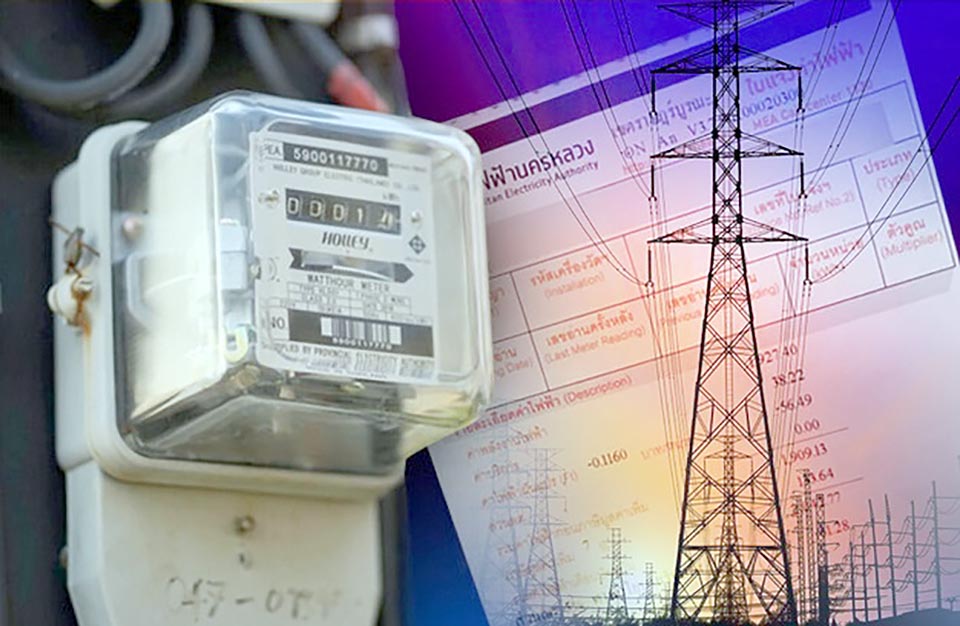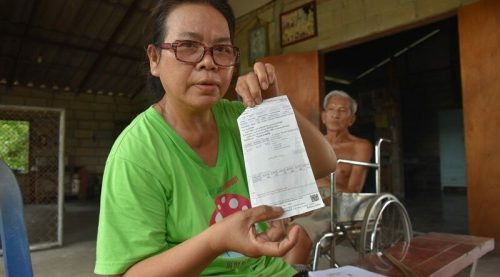Citizens in Thailand have taken to social media to slam to the Prime Minister over rising electricity costs during the summer months. Prime Minister Prayut Chan-o-cha responded Tuesday saying that the government is speeding up efforts to identify new sources of alternative energy.
He was responding to people on social media slamming the government for the high electricity costs and why he isn’t doing more to reduce people’s energy prices.
“We must consider why the bills are increasing. It is a complex subject that involves both production costs and management. “We’ll look into what we can do.” Don’t be concerned. “I’ll handle it myself,” said the prime minister.
He went on to say that power pricing reflect long-standing corporate activities and contractual responsibilities. “However, the government will make every effort to ensure that no one is disadvantaged,” Gen Prayut stated.
He went on to note that the government has been attempting to find and promote the use of less expensive energy sources, such as renewable energy, as well as encouraging local communities and homes to utilise solar cells to capture sunlight and turn it into electricity.
“We should also consider energy and petrol prices in other countries.” But don’t compare us to countries who produce their own energy.
“Thailand must continue to import energy from other countries because domestic natural gas supply in the Gulf of Thailand is diminishing.” We must import energy from either Myanmar or Malaysia.
“As a result, we must increase our efforts to find alternative energy sources.” “It won’t happen right away, but we’re making good progress,” Gen Prayut stated.
Netizens on social media have posted photographs of their high-priced bills, with one Facebook user claiming that he was infected with Covid-19 in April of last year and self-isolated at home for 16 days, using two air conditioners alternately. That month’s electricity bill was 1,348 baht.
“But this April, I used electricity as usual and took five days off during the Songkran holiday, but my power bill was 2,060 baht,” he explained.Between May and August, the Energy Regulatory Commission (ERC) recently agreed to implement a single electricity bill rate.
This will result in lower electricity prices for enterprises but higher bills for homeowners, which will be especially undesirable during the summer’s scorching heat.
The new cost will be 4.77 baht per kilowatt-hour, which is lower than the existing rate for enterprises, which is 5.33 baht per unit from January to April, but an increase from 4.72 baht per unit for families.
From March 10 to 20, the ERC conducted online polls to elicit feedback on its decision.
According to analysts, the move has been heavily criticized for benefiting the industrial sector, as the updated rates will allow enterprises to save 10% on their bills while families will suffer a 1% increase in electricity expenses.
The underlying factor is a 5% increase in the “fuel adjustment tariff,” or Ft, between May and August, whereas the Ft connected with industrial electricity demand is predicted to fall by 30%.
The government and ERC defended the higher Ft rate for households from May to August by claiming that a 3.2-billion-baht subsidy had already been paid to vulnerable groups, such as low-income earners and those utilizing fewer than 300 units.
Mingkwan Sangsuwan, a member of the Palang Pracharath Party’s strategy committee, stated that the party’s strategy committee agreed with a campaign pledge to reduce the rate to 2.50 baht per unit for households and 2.70 baht for the industrial sector by revising concession contracts for natural gas production in the Gulf of Thailand.
Sirikanya Tansakun, deputy leader of the Move Forward Party, stated that the party would reduce power bills by 70 satang per unit through utilising ERC processes. It would also allow customers to shop around and buy from other vendors besides Egat.
EGAT and Rising Electricity Costs in Thailand
The energy Generating Authority of Thailand (EGAT), the state-owned business in charge of generating, transferring, and distributing energy in Thailand, determines power costs. Electricity prices in Thailand vary according on consumer type, usage levels, and tariff rates.
Residential energy costs in Thailand are often tiered, which means that the rate per unit of electricity (kWh) rises as use rises. The more power a household consumes, the more they pay per unit consumed. In general, the first tier or block of electricity usage has the lowest rate, with increased costs for succeeding tiers.
In Thailand, commercial and industrial customers are typically taxed based on demand and usage levels, with varied tariff structures depending on their size and kind of operation.
It should be noted that electricity prices in Thailand may fluctuate due to a variety of factors such as fuel prices, exchange rates, and government policies.
For the most up-to-date and accurate information on power costs in Thailand, visit the EGAT website or contact the relevant electricity authority or utility provider in Thailand directly. They have the most up-to-date and accurate information about electricity rates and tariffs in the country.
EGAT provided some general information about the factors that may contribute to rising electricity costs in Thailand.
- Fuel prices: Thailand relies heavily on imported fossil fuels, such as natural gas and coal, for electricity generation. Fluctuations in global fuel prices can impact electricity costs in Thailand. If the prices of these fuels rise, it can lead to increased electricity generation costs, which may be passed on to consumers.
- Infrastructure investments: Thailand’s electricity infrastructure requires constant maintenance, upgrades, and investments in new power plants and transmission lines to meet the growing demand for electricity. These infrastructure investments can result in increased costs, which may be reflected in electricity tariffs.
- Renewable energy development: Thailand has been promoting renewable energy sources, such as solar, wind, and hydropower, to diversify its energy mix and reduce its reliance on fossil fuels. However, the initial investment costs for renewable energy projects can be high, and these costs may be passed on to consumers, leading to increased electricity prices.
- Government policies and regulations: Changes in government policies and regulations related to electricity generation, distribution, and pricing can impact electricity costs in Thailand. For example, changes in subsidies for renewable energy, adjustments to feed-in tariffs, or changes in tax policies can affect the overall cost structure of electricity generation, which may impact electricity prices.
- Exchange rates: Thailand’s electricity generation relies heavily on imported fuels, and fluctuations in exchange rates can impact the costs of importing these fuels. If the Thai Baht weakens against other currencies, it can increase the costs of importing fuels, which may be reflected in electricity prices.
- Demand and consumption patterns: Increased demand for electricity due to population growth, urbanization, and changes in consumption patterns can put pressure on the electricity supply and demand balance, which may result in increased electricity costs to meet the growing demand.
It’s important to note that electricity costs are influenced by a combination of factors and can vary over time. To get accurate and up-to-date information on electricity costs in Thailand, it’s best to refer to reliable sources, such as government websites, utility providers, or energy regulatory authorities.









